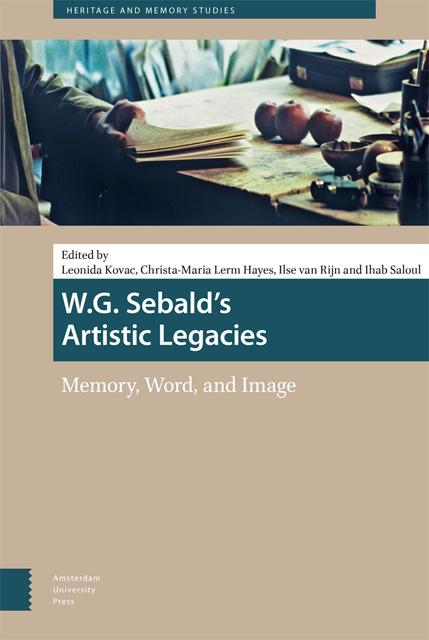14 - As a Dog Finds a Spear
Published online by Cambridge University Press: 26 October 2023
Summary
Abstract
In an interview shortly before his untimely death in 2001, W.G. Sebald shed light on how he pursued research: in a diffuse manner. Proudly he clarified that for refining his approach he had been contemplating at length how dogs run through a field. His was a way of proceeding exactly as a dog searches: to and fro, back and forth, sometimes slowly and at times fast until, eventually, there is a find. When, two years later, Susan Sontag paid tribute to her departed friend (in Regarding the Pain of Others), she emphasized Sebald’s extraordinary capacity for remembering, not by means of recalling a story but instead by calling up a picture. It was, according to Sontag, through seeding his narratives with photographs that he became the militant elegist we now continue to praise. Sebald, she added, actively wanted the reader to remember almost alongside with him, that which he himself still seemed in the process of gathering together with regard to lost lives, lost nature, and lost cityscapes. On both of these levels, Sebald’s artistic legacy has been a source of inspiration for writing my forthcoming book, Ground Sea. Photography and the Right to Be Reborn (Leuven University Press, 2020). The outcome of a decadelong investigation of the infamously called “migrant crisis” in Calais, France, this project started out as a classical study in photography theory (including case studies from the work of Allan Sekula, Sylvain George, and Bruno Serralongue among others). Encouraged by Sebald’s embedded way of working, however, reiterated field trips to the maquis of Calais and its vicinity proved necessary soon after the forceful eviction—between October 24 and 27, 2016—of 6,500 inhabitants from what French Government officials euphemistically called the “camp de la Lande.” From then on my art historical approach transformed into a creative practice geared toward turning cosmic vision, in the sense of Édouard Glissant in Philosophie de la relation (2009), into political ideas.
Keywords: Trans-generational, Visual, Sculpture, Tautological, Revolutionary
August the 2nd was a peaceful day. I sat at a table near the open terrace door, my papers and notes spread out around me, drawing connections between events that lay far apart but which seemed to me to be of the same order.
- Type
- Chapter
- Information
- W. G. Sebald's Artistic LegaciesMemory, Word, and Image, pp. 261 - 282Publisher: Amsterdam University PressPrint publication year: 2023

